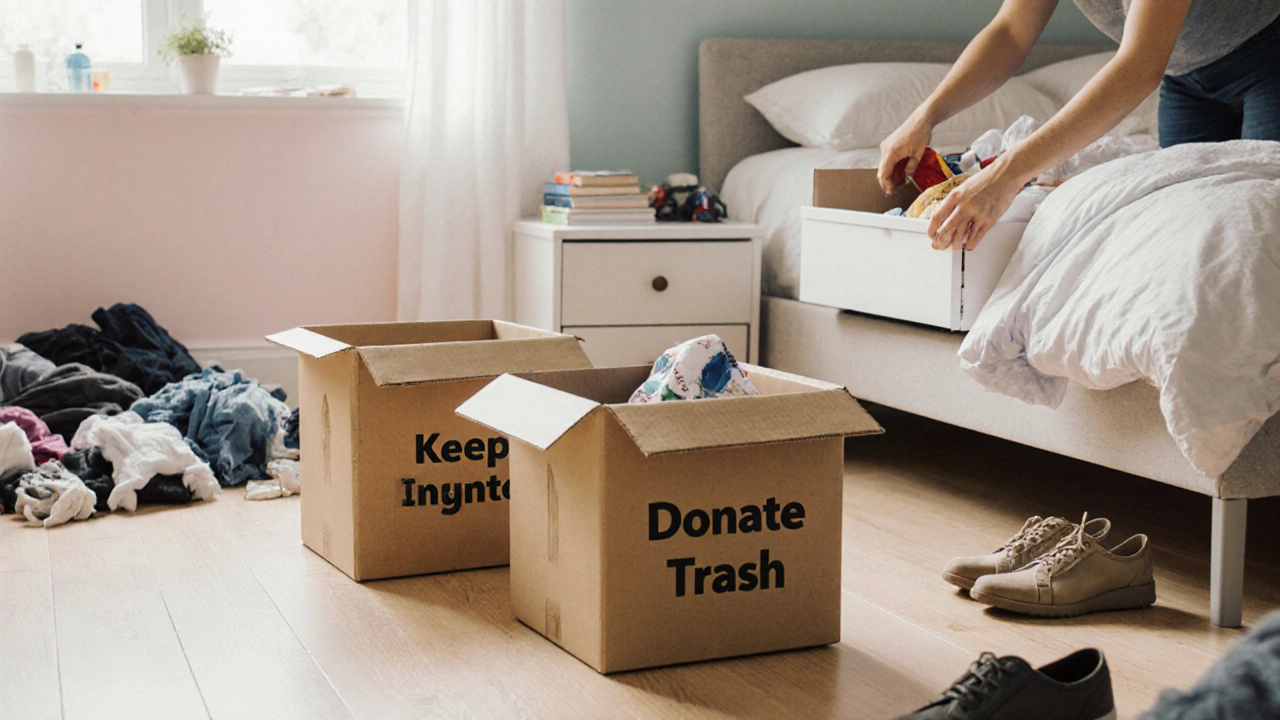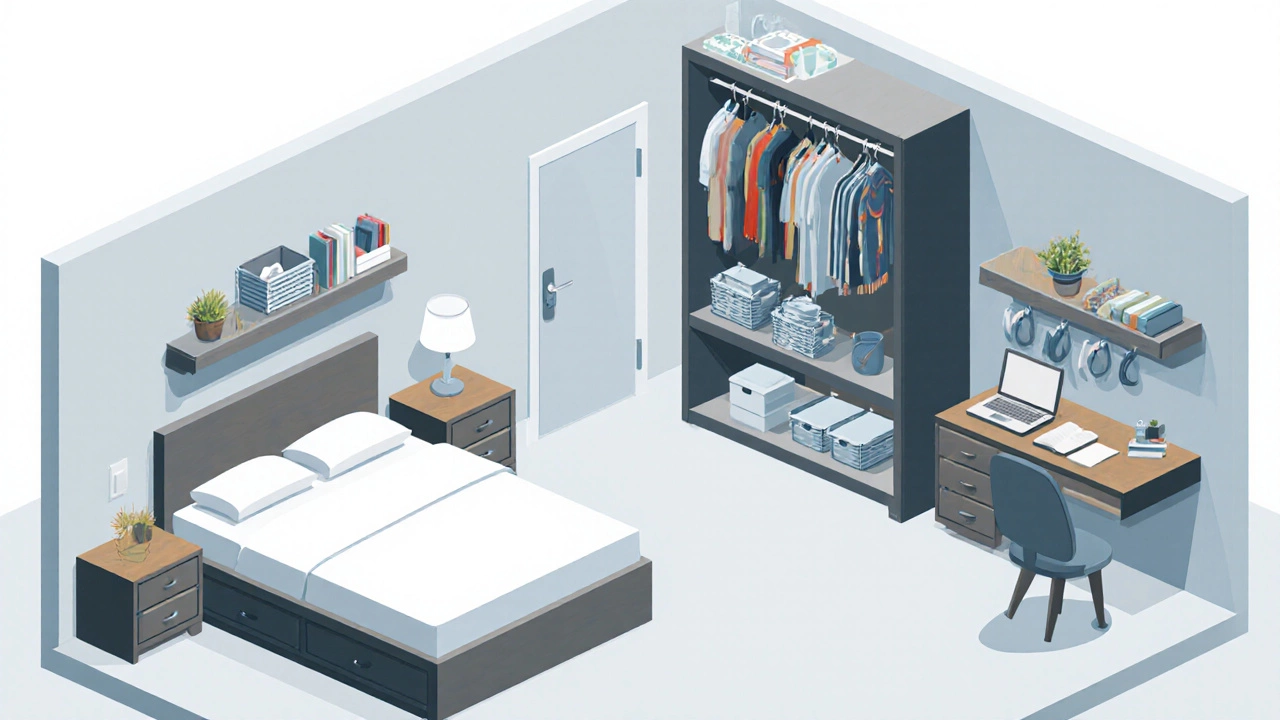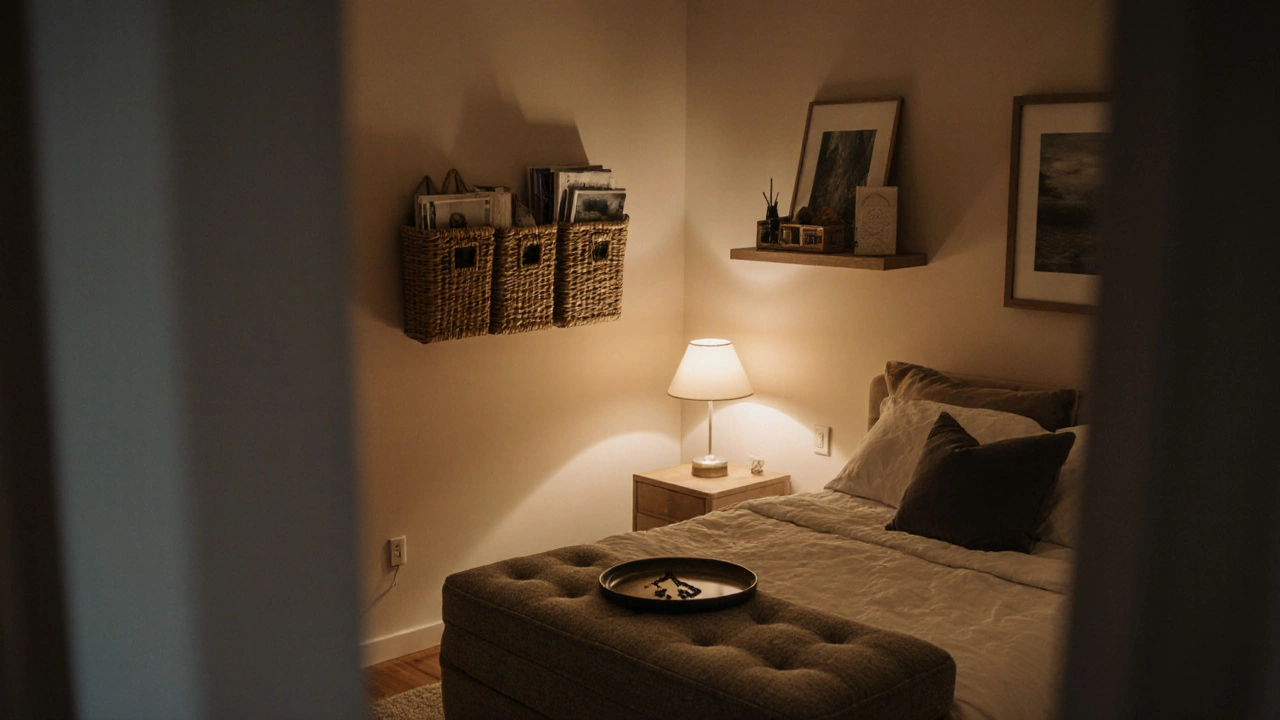Smart Bedroom Organization: Tackle Too Much Stuff with Simple Storage Solutions
 Oct, 14 2025
Oct, 14 2025
Bedroom Storage Calculator
Calculate Your Optimal Storage Solutions
Recommended Storage Solutions
Based on your needs:
Key Takeaways
- Start by removing items you don’t need; a quick sort saves space instantly.
- Group similar items into zones (sleep, dress, work) to keep flow natural.
- Use vertical space: wall‑mounted shelves, hanging organizers, and tall cabinets.
- Choose multi‑functional furniture like beds with drawers or a storage ottoman.
- Set a weekly 5‑minute reset routine to keep clutter from creeping back.
When a bedroom feels more like a storage unit than a place to rest, the first step is to rethink how everything is arranged. This guide walks you through a practical bedroom organization plan that turns chaos into calm without buying a whole new room.
Bedroom is a personal space that combines sleeping, dressing, and sometimes working areas. When too many belongings crowd it, the room’s function suffers, and stress builds. Below are the jobs you’ll accomplish: declutter, maximize storage, create zones, and maintain order.
1. Clear the Clutter - Decide What Stays
Grab three boxes labeled Keep, Donate, and Trash. Pull everything out of drawers, closets, and under the bed. A fast visual of every item helps you see duplicates and unnecessary pieces.
- Set a timer for 30 minutes per area (closet, nightstand, floor).
- Pick up each object and place it in the appropriate box.
- Immediately bag the Trash box and schedule a pickup for the Donate box.
Research shows that sorting in short bursts reduces decision fatigue and leads to higher discard rates.
2. Define Functional Zones
Think of your bedroom as a mini‑floor plan. Typical zones include:
- Sleep zone: the bed and bedside tables.
- Dressing zone: closet, dresser, and a full‑length mirror.
- Work/Relax zone: a small desk, reading chair, or meditation corner.
Placing each zone where it naturally belongs (e.g., keeping the desk near a power outlet) minimizes traffic and makes items easier to locate.

3. Choose the Right Storage Solutions
Now that you know what to keep and where to use it, pick storage that fits the zone. Below is a quick comparison of the most popular options.
| Solution | Typical Cost | Space Needed | Best For |
|---|---|---|---|
| Under‑bed storage | $30‑$120 | Uses space under the mattress | Seasonal clothing, shoes, extra linens |
| Wall‑mounted shelves | $20‑$200 per unit | Vertical wall space | Books, décor, baskets |
| Closet organizer | $50‑$250 | Inside existing closet | Hanging clothes, accessories |
| Multi‑functional furniture | $150‑$800 | Floor footprint | Seats with hidden storage, beds with drawers |
| Hanging organizers | $15‑$60 | Door or rod space | Accessories, shoes, small bags |
Each solution tackles a different type of clutter. Match the one that solves your biggest pain point first.
4. Implement Vertical Storage - Make the Walls Work
Wall space is usually under‑utilized. Installing wall‑mounted shelves near the desk or above the dresser creates visible storage without eating floor area. Use decorative boxes or woven baskets on the shelves to group similar items; this adds visual appeal while keeping things tidy.
5. Optimize the Closet with a closet organizer
Break the closet down into three layers:
- Top shelf for out‑of‑season items in labeled bins.
- Middle hanging rod for daily wear (use matching hangers to save space).
- Bottom drawer or shelving for shoes and accessories-consider a pull‑out shoe rack.
Adding a tension rod creates a second hanging line for scarves or belts, doubling the usable length.
6. Make the Bed a Storage Hub
Many bedrooms already have a bed frame with drawers. If not, consider an affordable platform with built‑in drawers. Store items you need less often, like spare blankets or holiday décor, inside these drawers. For a budget option, buy a set of under‑bed storage bins that slide in and out on rollers.
Label each drawer or bin with a large‑print tag; you’ll locate things faster and avoid opening every drawer to find a pair of socks.

7. DIY Hacks for Extra Space
When you can’t buy new furniture, a few DIY tweaks add storage instantly:
- Floating nightstand: mount a small shelf beside the bed and use decorative jars for chargers and glasses.
- Over‑door shoe rack: hang a fabric pocket organizer on the bedroom door for sneakers or flats.
- repurposed crates: stack wooden crates against a wall for a rustic bookshelf that also hides bins.
These hacks cost under $20 each but free up several square feet.
8. Maintain the System - A Weekly Reset
Even the best plan crumbles without upkeep. Schedule a five‑minute tidy‑up before bedtime:
- Return any stray items to their designated zone.
- Wipe down surfaces to keep dust from accumulating.
- Check the “Keep” box weekly; relocate anything that hasn’t been used in a month to a donation bin.
Consistency beats occasional deep cleans, and the habit becomes second nature after a couple of weeks.
9. Add Personality Without Adding Clutter
Styling shouldn’t sacrifice storage. Choose décor that doubles as a container:
- A storage ottoman that hides blankets.
- Decorative trays on nightstands to corral jewelry and watches.
- Wall art with built‑in pockets for passports or magazines.
These pieces keep the room looking curated while providing hidden storage.
Frequently Asked Questions
How often should I declutter my bedroom?
A quick quarterly sweep (every 3 months) works for most people. It prevents buildup and makes the annual deep clean easier.
Can I use a bookshelf as a closet?
Yes, if you add hanging rods or attach hooks to the sides. Combine the bookshelf with fabric bins for folded clothes to mimic a compact wardrobe.
What’s the best way to store shoes in a small room?
Use vertical shoe racks or wall‑mounted clear boxes. If you have a bed with drawers, dedicate one drawer to sneakers to keep the floor clear.
Are decorative baskets functional or just pretty?
When labeled and placed on shelves, they become real storage units for blankets, toys, or accessories, while also softening the room’s look.
How can I keep my desk tidy without a full filing cabinet?
Install a slim wall‑mounted organizer or use a stackable tray system. Keep only daily essentials on the surface and store papers in labeled accordion folders.